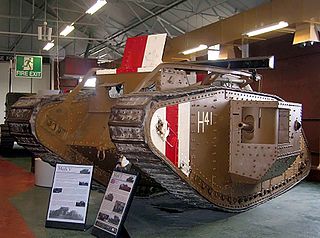
An armoured fighting vehicle or armored fighting vehicle (AFV) is an armed combat vehicle protected by armour, generally combining operational mobility with offensive and defensive capabilities. AFVs can be wheeled or tracked. Examples of AFVs are tanks, armoured cars, assault guns, self-propelled artilleries, infantry fighting vehicles (IFV), and armoured personnel carriers (APC).

Mechanized infantry are infantry units equipped with armored personnel carriers (APCs) or infantry fighting vehicles (IFVs) for transport and combat.
A division is a large military unit or formation, usually consisting of between 10,000 and 25,000 soldiers. In most armies, a division is composed of several regiments or brigades; in turn, several divisions typically make up a corps.

A brigade is a major tactical military formation that typically comprises three to six battalions plus supporting elements. It is roughly equivalent to an enlarged or reinforced regiment. Two or more brigades may constitute a division.
Corps is a term used for several different kinds of organization. A military innovation by Napoleon I, the formation was first named as such in 1805. The size of a corps varies greatly, but two to five divisions and anywhere from 40,000 to 80,000 are the numbers stated by the US Department of Defense.

The history of the tank includes all vehicles intended to advance under enemy fire while remaining protected.
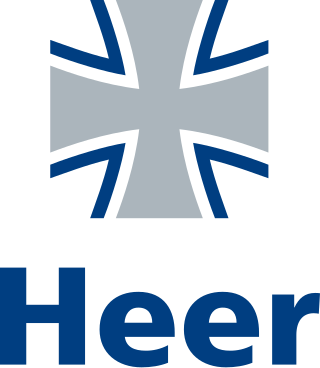
The German Army is the land component of the armed forces of Germany. The present-day German Army was founded in 1955 as part of the newly formed West German Bundeswehr together with the Marine and the Luftwaffe. As of 2024, the German Army had a strength of 63,047 soldiers.
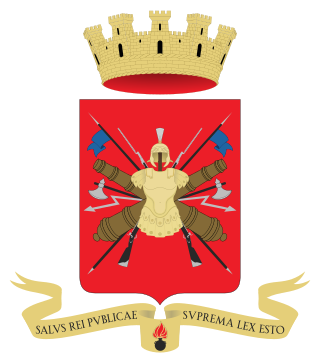
The Italian Army is the land force branch of the Italian Armed Forces. The army's history dates back to the Italian unification in the 1850s and 1860s. The army fought in colonial engagements in China, Libya, Northern Italy against the Austro-Hungarian Empire during World War I, Abyssinia before World War II and in World War II in Albania, Balkans, North Africa, the Soviet Union, and Italy itself. During the Cold War, the army prepared itself to defend against a Warsaw Pact invasion from the east. Since the end of the Cold War, the army has seen extensive peacekeeping service and combat in Afghanistan and Iraq. Its best-known combat vehicles are the Dardo infantry fighting vehicle, the Centauro tank destroyer and the Ariete tank and among its aircraft the Mangusta attack helicopter, recently deployed in UN missions. The headquarters of the Army General Staff are located in Rome opposite the Quirinal Palace, where the president of Italy resides. The army is an all-volunteer force of active-duty personnel.
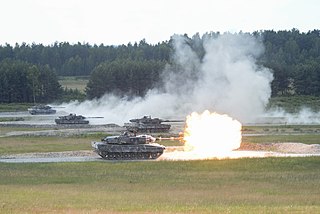
Armoured warfare or armored warfare, is the use of armoured fighting vehicles in modern warfare. It is a major component of modern methods of war. The premise of armoured warfare rests on the ability of troops to penetrate conventional defensive lines through use of manoeuvre by armoured units.

The Royal Canadian Armoured Corps is the armoured corps within the Canadian Army, including 3 Regular and 18 Reserve Force regiments, as well as the Royal Canadian Armoured Corps School.
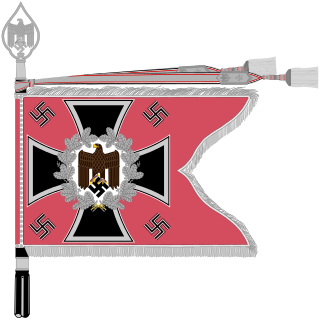
Panzerwaffe, later also Panzertruppe refers to a command within the Heer of the German Wehrmacht, responsible for the affairs of panzer (tank) and motorized forces shortly before and during the Second World War.

The black beret is a colour of beret, a type of headgear. It is commonly worn by paramilitaries and militaries around the world, particularly armored forces such as the British Army's Royal Tank Regiment (RTR), the Royal Canadian Armoured Corps (RCAC), and Royal Australian Armoured Corps (RAAC) and the Indian Army Armoured Corps and Indian Border Security Force. Notable non-armored military units to wear the black beret include the non-military police and non-special forces elements of the Irish Defence Forces, MOD Guard Service, Russian Naval Infantry and Russian OMON units, the United States Air Force (USAF) Tactical Air Control Party (TACP), Philippine National Police-Special Action Force (PNP-SAF) members, and the Royal Canadian Navy. It was also worn by the United Kingdom's Royal Observer Corps (ROC) with their Royal Air Force (RAF) uniform, Metropolitan Manila Development Authority (MMDA).

The Romanian Land Forces is the army of Romania, and the main component of the Romanian Armed Forces. Since 2007, full professionalization and a major equipment overhaul have transformed the nature of the Land Forces.
A tank corps was a type of Soviet armoured formation used during World War II.

The Bulgarian Land Forces are the ground warfare branch of the Bulgarian Armed Forces. It is administered by the Ministry of Defence, previously known as the Ministry of War during the Kingdom of Bulgaria. The Land Forces were established in 1878, when they were composed of anti-Ottoman militia (opalchentsi) and were the only branch of the Bulgarian military.

The Yugoslav Ground Forces was the ground forces branch of the Yugoslav People's Army (JNA) from 1 March 1945 until 20 May 1992 when the last remaining remnants were merged into the Ground Forces of the new Federal Republic of Yugoslavia, under the threat of sanctions.
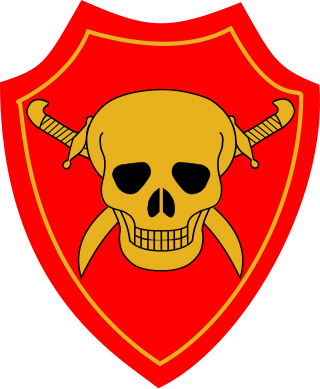
The Brigades for the Defense of the Revolution, commonly referred to as Defense Companies, Defense Corps or Defense Brigades were an all-Alawite paramilitary force in Syria that were commanded by Rifaat al-Assad. Their task was to defend the Assad government, and Damascus, from internal and external attack.

Horses in World War II were used by the belligerent nations, for transportation of troops, artillery, materiel, messages, and, to a lesser extent, in mobile cavalry troops. The role of horses for each nation depended on its military doctrines, strategy, and state of economy. It was most pronounced in the German and Soviet Armies. Over the course of the war, Germany and the Soviet Union together employed more than six million horses.

A squadron was historically a cavalry subunit, a company- or battalion-sized military formation. The term is still used to refer to modern cavalry units, and is also used by other arms and services. In some countries, including Italy, the name of the battalion-level cavalry unit translates as "Squadron Group".

The Russian Tank Troops is the armored warfare branch of the Russian Ground Forces. They are mainly used in conjunction with the motorized rifle troops in the main areas and perform the following tasks:
















